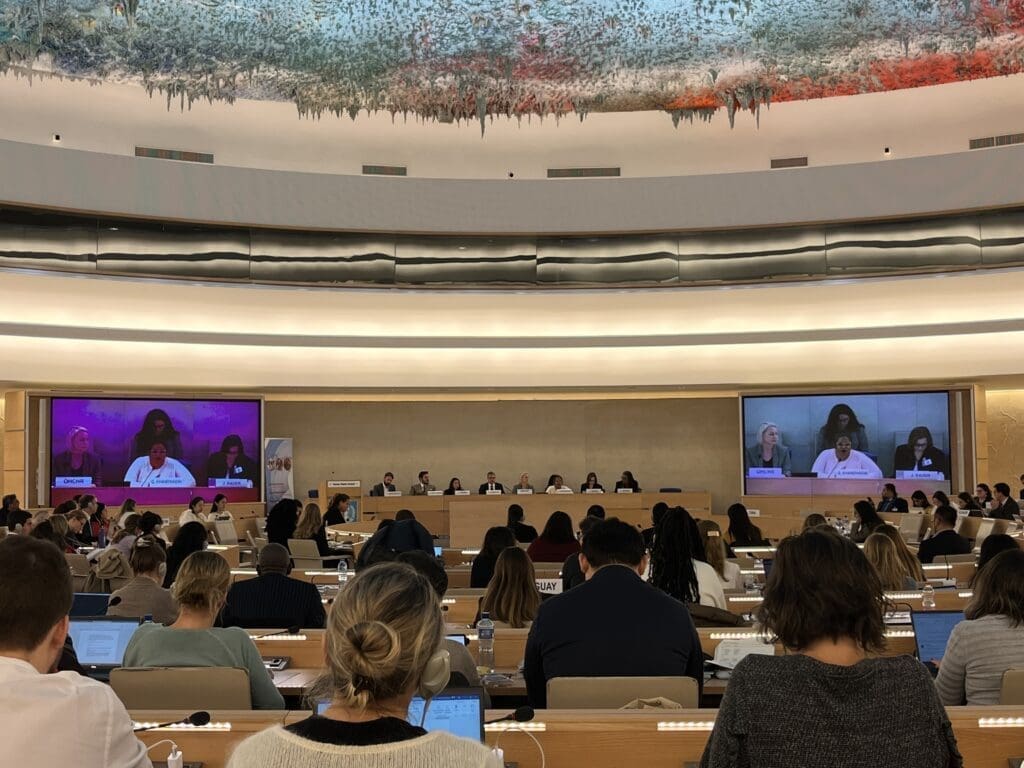As a global community, we will not achieve our goals for improved transparency, climate action, universal access to justice, and effective remediation if we do not protect and respect the right to defend human rights. We are pleased to have seen such a strong focus on the importance of human rights defenders (HRDs) and in putting right holders, people, and planet at the centre of business accountability in this year’s United Nations (UN) Forum on Business and Human Rights.
During the forum’s opening session, Fernanda Hopenhaym, Chairperson of the UN Working Group on Business and Human Rights, and Nada Al-Nashif, the Deputy High Commissioner for Human Rights of the OHCHR, immediately mentioned the importance of protecting, consulting, and supporting human rights defenders, setting the tone for the conference discussions. We are also pleased to have seen an entire panel focused on HRDs and their needs within this space. “The realisation of a clean, healthy and sustainable environment for all cannot be achieved if those who are at the forefront of its defense are in danger,” said Michel Forst, the first UN Special Rapporteur on Environmental Defenders, during his intervention.
When it comes to business and human rights, HRDs are more than key stakeholders, they are key change-makers and more importantly the right holders. HRDs raise the alarm when the rights of their communities are being violated, and they should be prioritised for protection.
Many companies continue to be directly and indirectly involved in violence against HRDs, criminalization of HRDs, and facilitating the impunity of attacks against HRDs due to a prioritization of profit over human rights and environmental protection. Since 2015, there have been 4295 attacks against HRDs registered by the Business Human Rights and Resource Centre (BHRRC).
According to the BHRRC, in 2020, 1 in 5 business-related attacks were recorded against women human rights defenders (WHRDs). At this year’s forum, we heard from a number of WHRDs who continue to express the challenges they face in carrying out their work, due to the fact that they are not considered in prior and informed consultation processes and they face persistent barriers to accessing justice after violations occur.
We also heard testimonials and stories from Indigenous peoples concerning the violations and the threats they continue to face: “What is at stake is our livelihood, our environment, and the collective survival of our communities and civilization,” says Joan Carling, executive director of the Indigenous Peoples Rights International, reflecting about the need for mandatory human rights due diligence and the need to protect Indigenous HRDs.
As stated by Nada Al-Nashif, “Both businesses and states need to step up and protect human rights defenders against reprisals.” Eleven years later, we are still discussing human rights violations and corporate misbehavior in their business model.
Protection International affirms its position that states must:
- adopt comprehensive, national public policies that mandate the protection of human rights defenders;
- ensure that corporations operating in their countries are held accountable for violations of the right to defend human rights and attacks against HRDs, and that judges are trained on how to identify cases where human rights defenders and their communities have been negatively impacted; and
- ensure that the protection of human rights defenders is done through an intersectional, gender sensitive, psychosocial approach, in alignment with the Risk Analysis and Protection Plan Principles.
Protection International affirms its position that companies must:
- recognize human rights defenders as key stakeholders throughout their due diligence processes including ensuring free and prior informed consent (FPIC) with impacted indigenous peoples, and local communities;
- ensure that communication with defenders is carried out thoughtfully and securely, allocating the necessary time and resources to engage with Indigenous and rural defenders who may be less easily accessible;
- develop corporate policies against strategic lawsuits against public participation (SLAPPs) that harm human rights environmental defenders and civil society organizations; and
- stop corporate capture, by way of fake consultations with HRDs and their communities, hollow human rights policies and legislative interference.
“Commitments, legislation, and compliance measures are long overdue. We need stronger regulations and implementation of strict due diligence regulating corporations all over the world,” said Mae Ocampo, Executive Director of Protection International.
Speaking to the United Nations, the European Union, and the larger human rights community, woman human rights defender Carolina De Moura concludes, “We are capable of creating another way of living well in our Common Home, Mother Earth. It is urgent. Tomorrow might be too late. We will continue to do our part. We are counting on you.”


